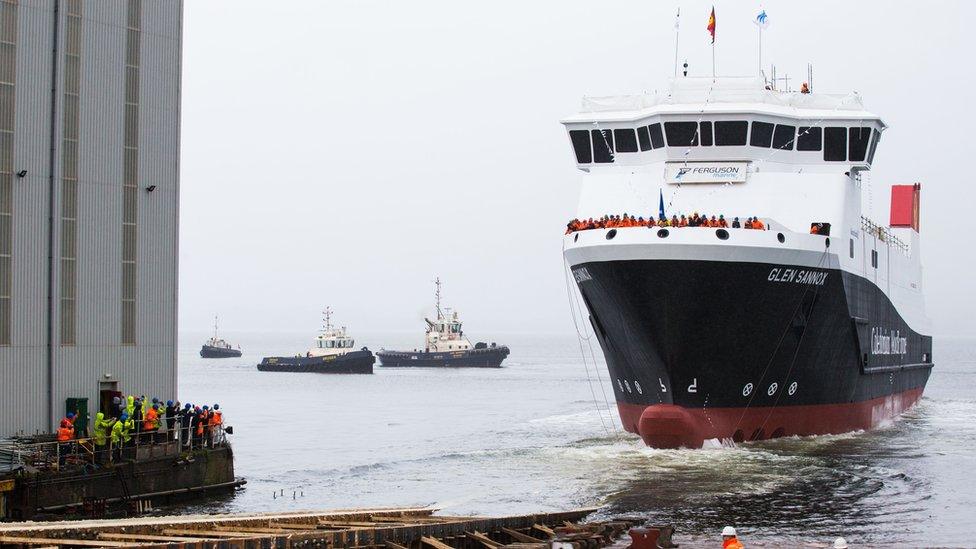A mixed bag when governments go shopping
- Published
The building of two innovative CalMac ferries has hit turbulent waters over the lack of advance planning.
Shipyard boss Jim McColl is concerned about getting more state support in the shape of bank guarantees.
On information technology, the problem is how to procure services that don't yet exist. So the Scottish government is asking the innovators to help.

MV Glen Sannox was expected to be ready this summer
The MV Glen Sannox can be seen afloat at the Port Glasgow quayside, where it looks a long way from being shipshape.
The vessel is a year behind schedule. We're not talking upturned boats here, but there is a sort of link with the Scottish Parliament building at Holyrood - which was apparently inspired by inverted vessels at Lindisfarne.
Both projects were/are unique and complex, and both ended up overdue and over-budget.
There were lots of lessons to be learned form the fiasco of commissioning the late Enric Miralles' architectural masterpiece.
One was to be careful of dealing with visionaries who design architectural masterpieces.
Perhaps the most useful was that government should not procure buildings when they aren't quite sure what is going to be involved, and when the design may change significantly in the process of building.

The Scottish Parliament building was overdue and over-budget
That's where, according to Ferguson Marine owner Jim McColl, things have veered off course with the £97m order for two CalMac ferries, being procured by the government firm that owns and leases ferries, Caledonian Maritime Assets Ltd. It leases to the operator, which is also government-owned.
There wasn't sufficient clarity about the project before going out to tender, says the billionaire businessman.
There was not, he adds, appreciation of the added complexity and delay of allowing for both Lloyds of London, the insurance giant, and the Maritime and Coastguard Agency, to certify the safety of the "prototype" design of a ship powered by both liquified natural gas (LNG) and marine oil.
There has been a year of talks about who is going to pay the additional cost of that delay and complexity and Jim McColl has been... he pauses, as he searches diplomatically for the right word: "frustrated".
It's with that background that the Scottish government agreed to a £30m loan facility for Ferguson Marine, on commercial terms.
At St Andrews House, they have struggled to explain precisely why that very large funding facility was necessary. To further diversify the yard, has been one explanation. Or to meet some of the additional costs of this contract's delay, we're now told.
A choppy start
So far, so familiar. Government procurement is not always that smart - though to its credit, Transport Scotland has been racking up a significant number of projects that have gone well. These have included the Queensferry Crossing, which opened to traffic a year ago.
The Ministry of Defence specialises in spectacular over-spends. The Royal Navy's Type 31 frigate has had a choppy start, as the government tries to push companies to compete in consortia, building the ships in modules.
That way, BAE Systems loses its monopoly on building complex ships. Ferguson Marine is geared up for building modules within a consortium led by Babcock.
Government seems to be least smart when it is trying to innovate and meet numerous objectives for speedy delivery, innovative contracting, modular build, scale of ship and, in Cal-Mac's case, greener fuel.

What risks getting lost amid all this is that Jim McColl, who salvaged the Ferguson's yard in Inverclyde from administration in 2014, has some big points to make about the unfair competition he says he's facing from foreign yards.
And he says Brexit won't make the problem go away. Any future trade deal is going to have constraints on what they call "state aid" in Brussels.
McColl sees taxpayer funds in Poland, Germany and the Netherlands may not be used for direct subsidy, but state-controlled banks in these countries provide the cash guarantees that such procurement projects require of shipbuilders.
The Holyrood administration is going down the road towards a Scottish National Investment Bank, which ought to be in a position to do that.
A UK government plan for a British Business Bank is currently being discussed at business gatherings around the country. Being the creation of the current government at Westminster, it is cannier about market intervention.
McColl told my colleague Andrew Black on Good Morning Scotland: "As we leave Europe, we're going to be competing with European countries for export work. Those countries have an infrastructure in place to support their industry and we don't, [so] we're not going to be able to win against them.
"These banks are not state aid, but if you try to do it through your government supporting it, that's state aid. You've got to be clever, and to do what's been done for years on the continent. We've missed out on it, and it's a very straightforward thing we have to do."
Graveyard for failed projects
There are very different ways of doing government procurement, and by chance, I was learning about one only a few minutes after Mr McColl's comments had been broadcast.
This is the procurement of IT services. Due to the scale on which government tends to do things, and because neither ministers nor civil servants are notable for their expertise in the field, information technology has become a notable graveyard for failed, expensive projects.
At CodeBase, in a vast and ugly former Department of Health and Social Security building in the shadow of Edinburgh Castle, as many as 1,000 people are working in young technology companies. One occupant tells me it's the biggest tech hub in Britain.
In their midst is a Scottish government unit, CivTech, designed to get the best out of these techie innovators.
Set them a challenge, goes the idea. That's instead of telling them the specification for the hardware and several ring-binders of detail on what it is expected to do.
Alexander Holt, who heads the CivTech unit, says it is a response to the problem of procuring what you don't and can't know exists, or that doesn't exist yet.

The challenge is a broad one - to shift the dial on the Scottish government's priorities for improving public services. One might be a specific on healthy eating, another in reducing re-offending or tackling educational exclusion.
Between six and 10 such challenges are taken on in each wave. "Safety in numbers," goes the argument. It matters less that way if one goes wrong.
Government is saying to its potential IT contractors: here's our problem, use your innovative nous to break through conventional thinking, and find new ways in which technologists can re-think the challenge in order to solve it.
We - that is, the government - will pay the three most interesting firms to work up their ideas, so that bidding for work becomes less of a winner-takes-all gamble. For government as procurer, by committing around a tenth of its budget to paying three firms to work up ideas, it can see not only which firm has the best ideas, but which one is best equipped and suitable to go through to the final contract.
'Gone awry'
Conventional procurement emphasises the importance of a potential contractor's capacity and capability, says Holt, but it is unable to get at the culture of that firm.
"That is where many an IT delivery has gone awry," the CivTech boss wrote in a recent blog.
"Only by working with a company, even for a short period, can you really get a sense of what they're like. The company that is a dream on paper may well turn out to be a nightmare in reality."
So, once one company has won the contract, if it is smart, it will see how that could be scaled up to address challenges well beyond Scotland.
That way, goes the argument, you get your problem solved - or a problem adjacent to it, perhaps, which you might not have realised was the key to unlocking the main problem. And you get a boost to the IT sector if it can scale up its new public sector thinking beyond Scotland.
The project is getting significant international attention and, I'm told, admiration - notably from Victoria state in Australia, from Poland and from Austria.
With three waves of such challenges now under way, these are early days to be clear about results, but they look promising in terms of firms' sticking power, in related contracts, and in adding additional jobs.